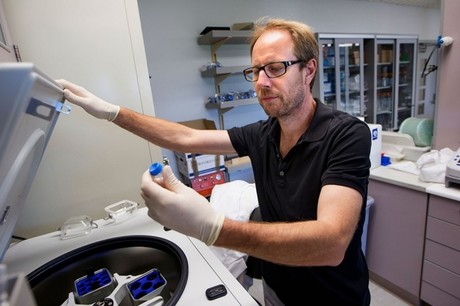Protein in umbilical cord blood boosts brain function

Researchers have discovered a protein in human umbilical cord blood that could be used for the treatment of age-associated declines in mental ability.
“Neuroscientists have ignored it and are still ignoring it, but to me it’s remarkable that something in your blood can influence the way you think,” said the study’s senior author, Tony Wyss-Coray, PhD, professor of neurology and neurological sciences and a senior research career scientist at the Veterans Affairs Palo Alto Health Care System. The lead author is former postdoctoral scholar Joseph Castellano, PhD, who is now an instructor of neurology and neurological sciences.
The findings by researchers at the Stanford University School of Medicine is published in Nature.
The protein, called tissue inhibitor of metalloproteases 2, or TIMP2, belongs to a well-known family of four TIMPs that regulate the activity of other proteins whose function is to chop up yet other proteins occupying the matrix in which cells are embedded.
Injecting TIMP2 by itself into elderly mice largely duplicated the beneficial effects of umbilical-cord plasma. It even restored these mice’s nesting capacity: an instinctive penchant, largely lost in old age, for using available materials, such as cotton wads supplied by the researchers, to build nests in which mice typically prefer to sleep. But old mice that were given human cord plasma depleted of TIMP2 derived no learning and memory benefits. And administering TIMP2-neutralising antibodies to young normal mice, who ordinarily perform well on memory tests, obliterated their prowess.
“TIMP2’s effects in the brain have been studied a little, but not much and not in ageing,” said Castellano. “In our study, it mimicked the memory and learning effects we were getting with cord plasma. And it appeared to do that by improving hippocampal function.”
Stanford’s Office of Technology Licensing has filed for patents related to the findings in the study. Alkahest, a biotechnology company based in San Carlos, California, in which Castellano and Wyss-Coray hold equity and which Wyss-Coray co-founded, has licensed rights to this intellectual property.
The study was funded by the National Institute on Aging, the Jane Coffin Childs Foundation, the Simons Foundation, the US Department of Veterans Affairs, the Glenn Foundation for Medical Research and the Stanford Brain Rejuvenation Project.
Stanford’s Department of Neurology and Neurological Sciences also supported the work.
Maternal protein intake affects offspring's facial features
New study findings emphasise the importance of maintaining a well-balanced diet during pregnancy,...
Gene discovery offers hope for new kidney disease treatments
Researchers have identified a gene that plays a crucial role in regulating energy supply to cells...
Oral UTI vaccine prevents infection for up to nine years
An oral spray-based vaccine could help prevent recurrent urinary tract infections (UTIs) for up...







